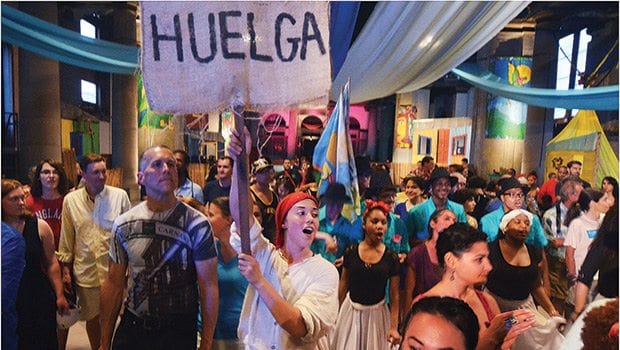La Alma de la Communidad
Local theater re-claims Boston’s Latin Quarter

Well over a hundred people assembled on the steps of the Blessed Sacrament church in Jamaica Plain on Sunday. In partnership with the Hyde Square Task Force, Double Edge Theatre transformed the small square into a bustling Latin American marketplace. Small groups sat at café tables strewn with dominoes while children eagerly licked helado samples distributed by actors dressed as street vendors. A guitarist in a formal bullfighter uniform strummed to the croons of his female counterpart. Carlos Uriona, co-artistic director at Double Edge, stands in the center of the scene, his smooth Argentinean accent bringing Boston’s Latin Quarter back in time. “Before this was Jamaica Plain, it was Shawmut,” he said. “Before this was Boston, it was our barrio.”

Author: Photo: Celina ColbyA dancer performs in Hyde Square.
“A Latin American Spectacle” was not so much a linear, narrative performance, as a wild, passionate celebration of cultural heritage. Inside Blessed Sacrament, aerialists twirled on colorful swings, singing joyfully up to the decaying ceilings of the abandoned church. The nave was transformed into a neighborhood street in pre-colonial South America. The audience walked through the church, amongst the actors, an essential component of the experience. Uriona, wheeled around on a raised staircase, provided loose thoughts about the passage of time and the strength of community to supplement the song and dance of the performers.
Community wasn’t just the message of the performance, but the process. Double Edge Theatre worked with high school students in the area to foster participation in the arts as well as neighborhood pride. In a phone conversation, Uriona stressed the importance of this kind of collaboration for students in underserved areas.
“That’s how we start changing the narrative,” he said.
Much of “A Latin American Spectacle” was taken from Uriona’s own experience in dictator-run Buenos Aires. He altered the content to specifically reference the development of condos and luxury housing, which has had a considerable effect on cultural communities in the Boston area.
In “Spectacle,” conflict came when a colonizer swung from the rafters, yelling for his workers to keep building, assuaging the locals that the industrial development would be better for everyone. But his cries were drowned out by the barrio, as the actors and guests paraded out of the church and down Centre Street. The performance became a physical take-back of the neighborhood as actors played music, danced, and waved flags down the street. Shopkeepers came out of empanada restaurants and cigar stores to watch the parade. By this point in the spectacle it was no longer performance, it was a community coming together to celebrate their heritage.
Jamaica Plain has been coping with steady gentrification for the past several years. In 2014 when the Whole Foods was built on Centre Street, replacing the Latin American-themed Hi Lo grocery store, local bodega owners felt the chill of corporate competition. Seeing these same business owners lining the street, clapping their hands to the music as the parade of performers walked through the neighborhood, was a reminder that the Latin culture is still very much alive in JP, and that the locals are willing to fight for it.
The performance was the kickoff of the Hyde Square Task Force’s ¡Viva! program, celebrating the rich cultural history of Boston’s Latin Quarter — the name the nonprofit has assigned to the Hyde Jackson Square area that has long served as a commercial hub for the city’s Latino community. The summer-long schedule of events includes Spanish opera and theatre, domino tournaments, movie nights, and fitness events. Details are available at hydesquare.org.
The parade came to a crescendo in Mozart Park, where Uriona reflected on the power of community, “The world is always changing, always adapting,” he said. “But the barrio is a place for anyone and everyone who wishes to live intensely together.” Ultimately, the power of community spirit is in the people, not the place. This was clearly demonstrated by the crowd at Spectacle. People of all ages, genders, and nationalities, dancing in the street together, singing to the Jamaica Plain sky.







